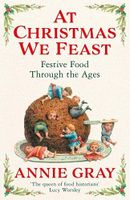The Twelve Days
Merriment, Mischief and Mirth
By Annie Gray
Published 2021

From Garrett, Theodore, The Encyclopaedia of Practical Cookery (London, L. Upcott Gill, 8 vols, c.1895).
Everything has to start somewhere. In the case of Christmas, it was in the fourth century, when the early Christian Church adopted the period around late December and early January as the time for celebrating the birth of Christ. In doing so it harnessed a broad-ranging set of existing traditions, most of which focused on lighting fires, feasting and drinking. It was the quietest time of the year for farming, thus lending itself to time off. The word Christmas was first recorded much later, in the eleventh century. Two centuries after that, there were already complaints that it was a season of gluttony, groping and having far too much to drink. Throughout its history the celebratory side of the season has always triumphed over the religious side.2 That’s not to say the religious observance didn’t matter, but the Christian Church (or most of its denominations) pragmatically took the view that wild partying and gustatory enjoyment was all part of the festival. It meant that Christmas was highly successful and widely observed. As a universal festival, it also meant that it quickly became seen as highly traditional, with certain themes – notably hospitality, goodwill and making merry – embedded within it from very early on.
Become a Premium Member to access this page
Unlimited, ad-free access to hundreds of the world’s best cookbooks
Over 160,000 recipes with thousands more added every month
Recommended by leading chefs and food writers
Powerful search filters to match your tastes
Create collections and add reviews or private notes to any recipe
Swipe to browse each cookbook from cover-to-cover
Manage your subscription via the My Membership page
Advertisement
Advertisement


